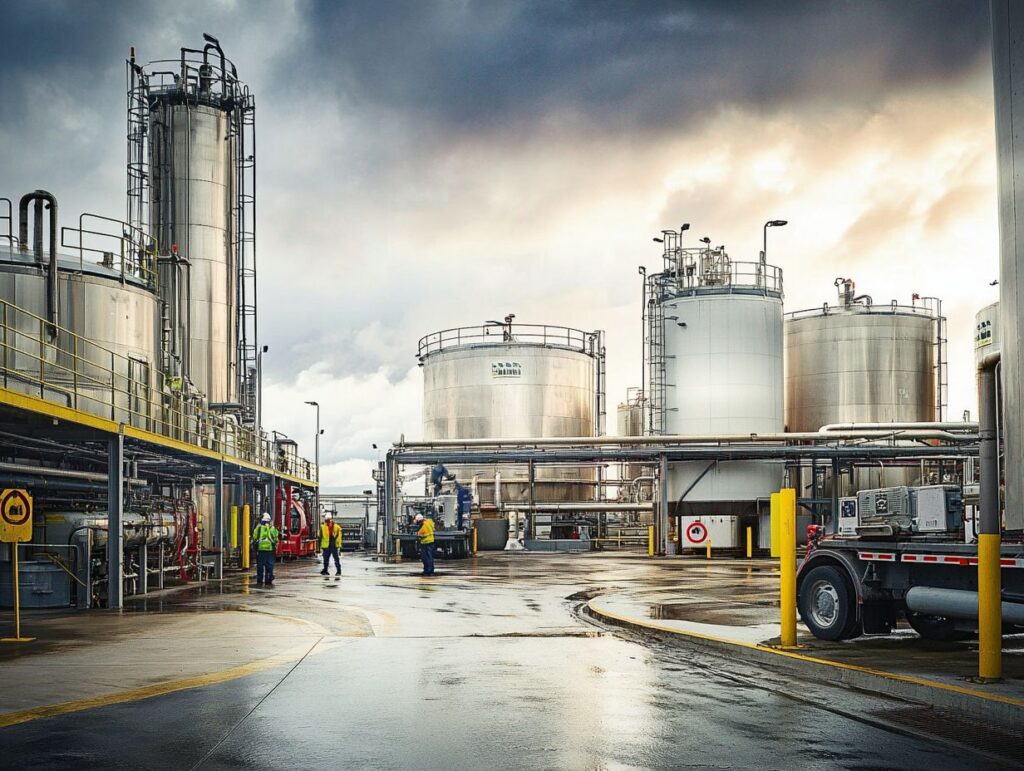Challenges Ahead: UK Biofuel Producers Grapple with Supply Chain Issues and Regulation
The UK biofuel industry stands at a crucial crossroads, balancing impressive growth potential with significant challenges. As producers strive to meet rising demand, they face hurdles in sourcing and distribution, compounded by evolving regulations that could reshape the landscape.
We explore the current state of the biofuel sector, the financial and operational hurdles producers encounter, and the innovative strategies employed to navigate these complexities.

Overview of the UK Biofuel Industry
The UK biofuel industry is a key player in the nation’s renewable energy landscape, reflecting a firm commitment to sustainability and energy security. With a strong focus on innovation and technological advancements, UK biofuel producers will work hard to adapt to market changes and meet the growing demand for environmentally friendly options.
Certainly, they face challenges such as supply chain disruptions and regulatory obstacles, but this sector has considerable growth potential, especially in biofuel production and sourcing biomass feedstock. Stakeholders are actively planning for the long term, enhancing energy independence while also aiming to reduce greenhouse gas emissions.
Current State and Growth Potential
The current state of the UK biofuel industry presents challenges and opportunities, all driven by changing biofuel regulations and the growing demand for renewable energy solutions.
Production challenges, such as sourcing sustainable feedstocks and maintaining efficient supply chains, can make growth rather tricky. Additionally, fluctuating oil prices can throw a spanner in the works, creating uncertainty that influences investment decisions among stakeholders.
However, don’t let those hurdles discourage you—significant investment opportunities are available if you are willing to delve into the market’s complexities. Understanding the impact of policy changes, such as the Renewable Transport Fuel Obligations (RTFO), can help you see how these shifts interact with the broader market dynamics.
With the right insights, you can uncover pathways for innovative companies to thrive and help meet the UK’s renewable energy targets.

Supply Chain Challenges
Supply chain challenges are a significant obstacle for UK biofuel producers, affecting their ability to deliver consistent and efficient renewable energy solutions.
Transportation logistics and feedstock availability can create bottlenecks, complicating procurement strategies and causing prices to fluctuate wildly.
Issues with Sourcing and Distribution
Sourcing and distribution issues are major headaches for UK biofuel producers, especially given the ever-growing demand for reliable agricultural commodities in a constantly shifting market.
These challenges become even trickier when considering the complicated logistics of moving raw materials from farms to processing facilities. Seasonal changes in crop yields can disrupt supply chains, creating a great deal of uncertainty that needs to be navigated.
To tackle these hurdles, many stakeholders are considering logistics optimisation strategies to boost efficiency and reduce costs. They can refine their forecasting and route planning using advanced analytics and technology, ensuring that biofuel production remains sustainable and can better withstand market fluctuations.
Improved market access can also make distribution smoother, helping producers connect with consumers more effectively while minimising waste.
Regulation of Biofuel Production
The regulation of biofuel production in the UK is rather intricate. It’s all influenced by biofuel regulations, government policies, and changing environmental standards designed to promote sustainability and energy efficiency.
Understanding this landscape can be challenging, but it’s essential to stay ahead of the game.
Current Regulations and Potential Changes
Current regulations surrounding biofuel production present unique challenges for you as a UK producer, especially with the potential influence of EU regulations on local compliance frameworks.
You often navigate complex compliance hurdles, dealing with a maze of standards and criteria that can differ wildly from one jurisdiction to another. Fluctuating investment risks create a shaky financial environment, leaving you and your stakeholders wrestling with uncertainties caused by regulatory changes.
The possibility of increased scrutiny and new legislation means you need to adapt quickly, which could lead to higher costs and operational disruptions. As the regulatory landscape shifts, you must stay alert—any upcoming changes could significantly reshape market dynamics, affecting your competitiveness and sustainability efforts in the biofuel sector.
Impact on Producers
The impact of regulatory frameworks and supply chain challenges on UK biofuel producers is significant. It creates financial and operational hurdles that can hinder market growth and competitiveness.
Financial and Operational Challenges
Financial and operational challenges in the biofuel sector can throw you for a loop, especially with those pesky market fluctuations. Rising production costs pose significant financial risks for you as a UK biofuel producer.
These issues disrupt the stability of your operations and complicate long-term planning and investment strategies. You might feel at a crossroads as you deal with unpredictable raw material prices and constantly changing regulations.
Navigating these financial risks can seem daunting, but also opens opportunities for innovative solutions and alternative investments. By optimising your operational efficiency and investing in advanced technologies, you can tackle these risks head-on, ultimately creating a more resilient business model that helps you thrive even in volatile market conditions.
Efforts to Overcome Challenges
You’ll find that efforts to tackle challenges in the UK biofuel industry focus on innovative solutions. It’s all about collaboration among stakeholders and making progress in research and development to enhance resource management.
Innovative Solutions and Collaborative Efforts
Innovative solutions and collaborative initiatives are essential for you as a UK biofuel producer if you want to keep up with changing consumer preferences and the growing demand for alternative fuels.
These efforts enhance production efficiency and address environmental concerns by using waste materials and promoting sustainable practices. For example, when agricultural sectors collaborate with technology firms, they make significant progress using crop residues and organic waste for biofuel production.
Furthermore, initiatives focusing on developing advanced biofuels resonate with consumers who desire greener energy sources, attracting investors and stakeholders interested in sustainable growth.
You can effectively meet market demand by encouraging collaboration and innovation while taking ecological responsibility seriously.
Future of the UK Biofuel Industry
The future of the UK biofuel industry depends on your ability to engage in strategic long-term planning. Predictions indicate that biofuels are set to play a larger role in the energy transition, especially as we tackle the ongoing challenges of climate change.
Predictions and Potential Solutions
Predictions for the UK biofuel industry suggest a growing focus on sustainability goals and the need for strong investment strategies to ensure market access and competitiveness.
As you navigate changing regulations and consumer expectations, it is becoming increasingly clear that developing environmentally friendly practices aligning with long-term goals is essential. Industry analysts point out that embracing innovative technologies boosts productivity and helps reduce biofuel production’s carbon footprint.
To support these efforts, financial incentives such as grants and tax relief can help lower the barriers for smaller players, encourage competition, and promote the use of cleaner fuels. The industry can move towards a more sustainable future by tapping into these financial mechanisms while enhancing economic resilience and energy security.